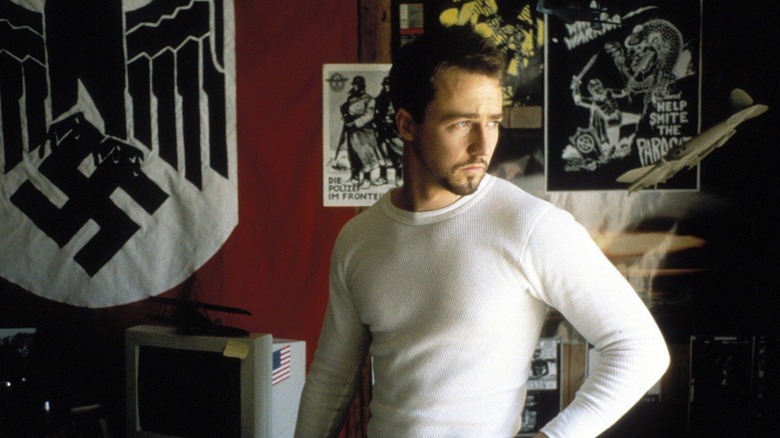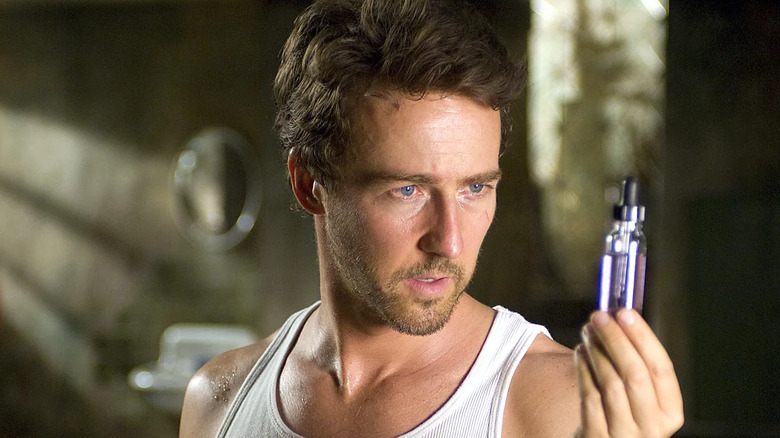"American History X" is a hard-hitting story about intergenerational racism. Edward Norton stars as Derek Vinyard, a reformed skinhead who tries to rescue his younger brother Danny, played by a pensive Edward Furlong, from the clutches of the neo-Nazi movement. "American History X" was critically hailed and Norton received an Oscar nomination for Best Actor for his formidable performance. In his essay for The Guardian, "American History X" director Tony Kaye explains why he cast Norton in the role, and why the actor ended up working more behind the scenes.
"When New Line sent me the script of 'American History X,' about the relationship between a neo-Nazi and his impressionable kid brother, it was deeply flawed. I thought I could manoeuvre around it: invent stuff, improvise, improve what was on the page. That was one of the reasons I went along with the studio's idea to cast Edward Norton. At the time Norton was Hollywood's golden boy, although personally I didn't think he had enough weight or presence. I held some open casting calls but I couldn't find anyone better than him. And one advantage of having Edward was that we had a shared vision of how to improve the script. In casting him I was really buying another writer."
Norton's collaboration with Kaye on the script, rewriting much of the dialogue, led to an acrimonious battle for artistic control. The director went on a rampage against his star and New Line Cinema, eventually disowning the version of "American History X" that would appear in theatres, mainly because Norton contributed greatly to the shaping of the film's final edit.
Editing American History X

After the first screening of his 95-minute cut, Kaye received lengthy notes from New Line Cinema and Norton on how it could be improved. This enraged the director, but then he began imagining a radical new version of the film that would require a year to remake. The studio refused and allowed Norton to work on a new cut with an assistant editor — a move that outraged Kaye so much he punched a wall and broke his hand. Kaye unleashed a temper tantrum of epic proportions: petitioning to have his name removed from the credits or be listed as "Humpty Dumpty," spending thousands on 35 full-page ads in Hollywood trade papers condemning Edward Norton and the producers, and removing the film from the Toronto International Film Festival.
Kaye was incredibly passionate about his singular vision for the film which, in his opinion, was being destroyed by Norton and the studio. He resented the final version of "American History X," feeling it over-emphasized the emotional performances and had too many melodramatic close-ups of characters crying in each other's arms. "And, of course, Norton had generously given himself more screen time," he chides in his Guardian essay. Yet even though Kaye describes Norton as a "narcissistic dilettante," he would still work with him again "because he is phenomenally talented."
Re-Writing Various Scripts

There have been other instances besides "American History X" where Edward Norton didn't just act in a film. He frequently argued over the script of "Red Dragon" with director Brett Ratner. Ratner explains some of the challenges of working with Norton in an interview with the Los Angeles Times, saying "He likes to challenge the director. It's all about intellectual debate … Edward's instinct is going to be, 'I have to take over this film.' He's going to try to rescue the film. That's both a blessing and a curse."
Norton wrote parts of "The Incredible Hulk" script to improve the green monster's character arc. Director Louis Leterrier told Empire, "Edward's script has given Bruce's story real gravitas," but the original screenwriter Zak Penn was disappointed in the changes, confessing to Entertainment Weekly, "I wasn't happy with him coming to Comic-Con saying that he wrote the script." Norton would not return for a "The Incredible Hulk" sequel or "The Avengers" in 2012, missing his chance to be a part of the mammoth Marvel Cinematic Universe.
Salma Hayek, Norton's ex-girlfriend, was pleased with their collaboration on "Frida." He "beautifully rewrote the script several times and appallingly never got credit" when she was under immense pressure from Harvey Weinstein to meet a tight deadline (per The New York Times).
All of this controversy gave Norton the reputation of being a difficult actor to work with — someone who would take over the director's vision to suit his own egotistical needs. But Norton defends himself in the Telegraph as being committed to his art and striving to make the best film possible — even if that means he has to be more than just the star.
Read this next: 14 Remakes That Are Better Than The Original
The post Edward Norton Did A Lot More Than Act For American History X appeared first on /Film.

